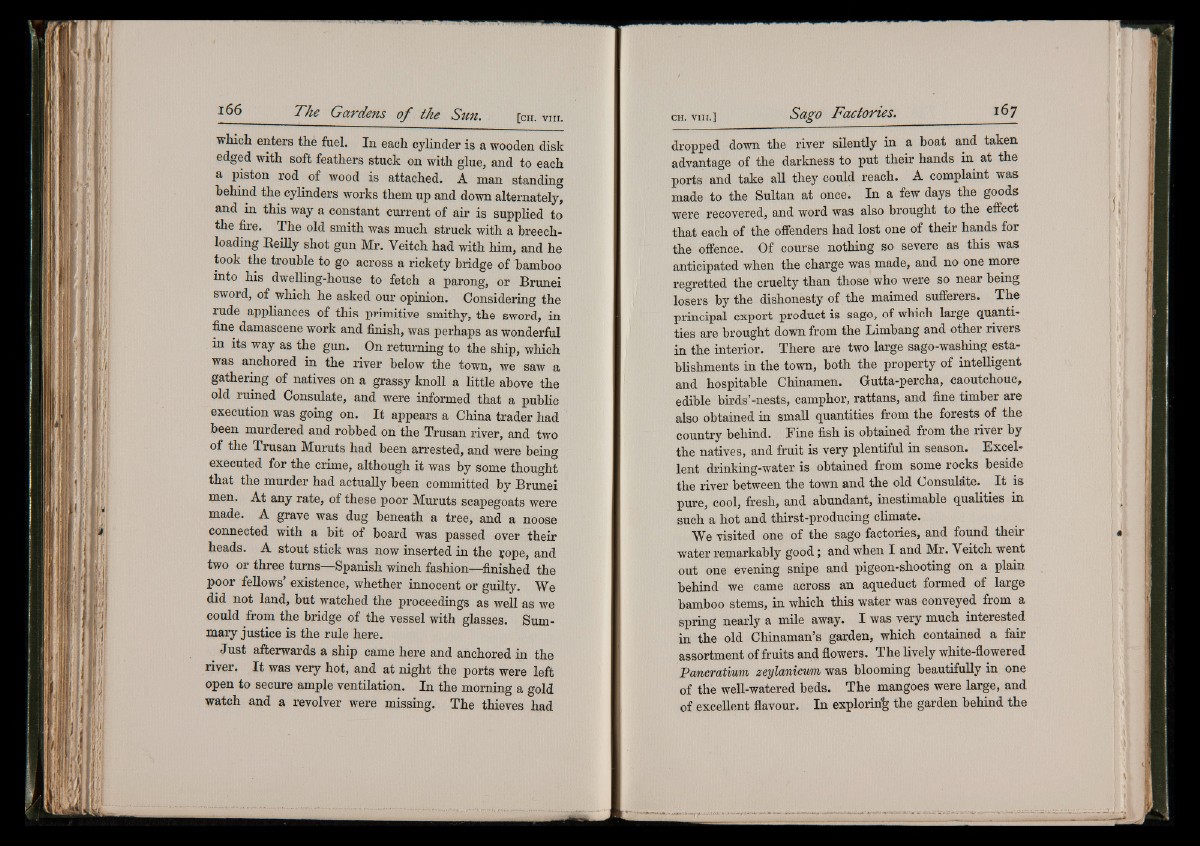
which enters the fuel. In each cylinder is a wooden disk
edged with soft feathers stuck on with glue, and to each
a piston rod of wood is attached. A man standing
behind the cylinders works them up and down alternately,
and in this way a constant current of air is supplied to
the fire. The old smith was much struck with a breech-
loading Reilly shot gun Mr. Yeitch had with him, and he
took the trouble to go across a rickety bridge of bamboo
into his dwelling-house to fetch a parong, or Brunei
sword, of which he asked our opinion. Considering the
rude appliances of this primitive smithy, the sword, in
fine damascene work and finish, was perhaps as wonderful
in its way as the gun. On returning to the ship, which
was anchored in the river below the town, we saw a
gathering of natives on a grassy knoll a little above the
old ruined Consulate, and were informed that a public
execution was going on. It appears a China trader had
been murdered and robbed on the Trusan river, and two
of the Trusan Muruts had been arrested, and were being
executed for the crime, although it was by some thought
that the murder had actually been committed by Brunei
men. At any rate, of these poor Muruts scapegoats were
made. A grave was dug beneath a tree, and a noose
connected with a bit of board was passed over their
heads. A stout stick was now inserted in the tope, and
two or three turns—Spanish winch fashion—finished the
poor fellows’ existence, whether innocent or guilty. We
did not land, but watched the proceedings as well as we
could from the bridge of the vessel with glasses. Summary
justice is the rule here.
Just afterwards a ship came here and anchored in the
river. It was very hot, and at night the ports were left
open to secure ample ventilation. In the morning a gold
watch and a revolver were missing. The thieves had
dropped down the river silently in a boat and taken
advantage of the darkness to put their hands in at the
ports and take all they could reach. A complaint was
made to the Sultan at once. In a few days the goods
were recovered, and word was also brought to the effect
that each of the offenders had lost one of their hands for
the offence. Of course nothing so severe as this was
anticipated when the charge was made, and no one more
regretted the cruelty than those who were so near being
losers by the dishonesty of the maimed sufferers. The
principal export product is sago, of which large quantities
are brought down from the Limbang and other rivers
in the interior. There are two large sago-washing establishments
in the town, both the property of intelligent
and hospitable Chinamen. Gutta-percha, caoutchouc,
edible birds’-nests, camphor, rattans, and fine timber are
also obtained in small quantities from the forests of the
country behind. Fine fish is obtained from the river by
the natives, and fruit is very plentiful in season. Excellent
drinking-water is obtained from some rocks beside
the river between the town and the old Consulate. It is
pure, cool, fresh, and abundant, inestimable qualities in
such a hot and thirst-producing climate.
We visited one of the sago factories, and found their
water remarkably good; and when I and Mr. Veitch went
out one evening snipe and pigeon-shooting on a plain
behind we came across an aqueduct formed of large
bamboo stems, in which this water was conveyed from a
spring nearly a mile away. I was very much interested
in the old Chinaman’s garden, which contained a fair
assortment of fruits and flowers. The lively white-flowered
Pancratium zeylanicu/m was blooming beautifully in one
of the well-watered beds. The mangoes were large, and
of excellent flavour. In exploring the garden behind the